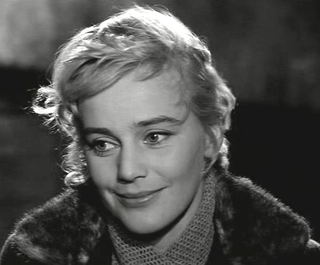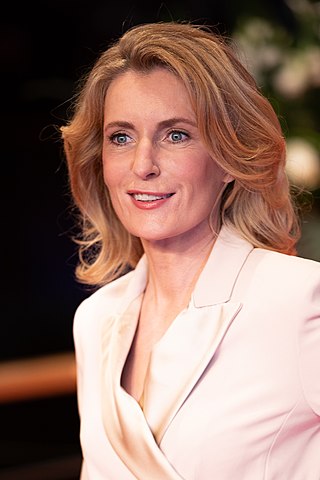
Curd Gustav Andreas Gottlieb Franz Jürgens was a German-Austrian stage and film actor. He was usually billed in English-speaking films as Curt Jurgens. He was well known for playing Ernst Udet in Des Teufels General. His English-language roles include James Bond villain Karl Stromberg in The Spy Who Loved Me (1977), Éric Carradine in And God Created Woman (1956), and Professor Immanuel Rath in The Blue Angel (1959).

Maria Margarethe Anna Schell was an Austrian-Swiss actress. She was one of the leading stars of German cinema in the 1950s and 1960s. In 1954, she was awarded the Cannes Best Actress Award for her performance in Helmut Käutner's war drama The Last Bridge, and in 1956, she won the Volpi Cup for Best Actress at the Venice Film Festival for Gervaise.

Armin Mueller-Stahl is a retired German actor who also appeared in numerous English-language films since the 1980s. He was nominated for the Academy Award for Best Supporting Actor for his role in Shine. In 2011, he was awarded the Honorary Golden Bear.

Helmut Käutner was a German film director active mainly in the 1940s and 1950s. He entered the film industry at the end of the Weimar Republic and released his first films as a director in Nazi Germany. Käutner is relatively unknown outside of Germany, although he is considered one of the best filmmakers in German film history. He was one of the most influential film directors of German post-war cinema and became known for his sophisticated literary adaptations.

Maria Furtwängler-Burda is a German physician and television actress.

Gottfried John was a German stage, screen, and voice actor. A longtime collaborator of Rainer Werner Fassbinder, John appeared in nine of his films between 1975 and 1981, the year before Fassbinder's death, including Eight Hours Don't Make a Day, Mother Küsters Goes to Heaven, Despair, The Marriage of Maria Braun, and Berlin Alexanderplatz. His distinctive, gaunt appearance saw him frequently cast as villains, and he is best known to audiences for his role as the corrupt General Arkady Ourumov in the 1995 James Bond film GoldenEye and his comedic turn as Julius Caesar in Asterix & Obelix Take On Caesar, for the latter of which he won the Bavarian Film Award for Best Supporting Actor.

Hans Neuenfels was a German writer, poet, film producer, librettist, theatre director, opera director and theatre manager. As a director, he first focused on drama, staged at prominent houses such as the Vienna Burgtheater, and became a leading exponent of German Regietheater. From 1974, he turned to opera, looking for "the subliminal of the music and the interlinear of the texts", for "surprisingly new, sometimes even disturbingly ambivalent perspectives on the works".

Ernst Gerhard Ludwig Jacobi-Scherbening, professionally called Ernst Jacobi, was a German actor. He was known for serious character roles, especially in the 1979 film The Tin Drum, as Hans in Germany, Pale Mother (1980), as Adolf Hitler in Hamsun (1996), and as the narrator in The White Ribbon (2009). He appeared in over 200 television productions and worked at the Burgtheater in Vienna from 1977 to 1987, and at the Schauspielhaus Zürich from 1987 to 1992. In 1975 he won the Berliner Kunstpreis for his portrayal of Alexander März in the television film Das Leben des schizophrenen Dichters Alexander März.
The Woman and the Stranger is a 1985 East German film directed by Rainer Simon. It is based on Leonhard Frank's novella "Karl und Anna" and tells the story of two friends in a POW camp during World War I. One of them escapes and forms a relationship with the other man's wife. After the war her husband returns. The film was entered into the 35th Berlin International Film Festival, where it won the Golden Bear.
![<i>The Devils General</i> 1955 [[West Germany]] film](https://upload.wikimedia.org/wikipedia/en/3/32/The_Devil%27s_General.jpg)
The Devil's General is a 1955 black and white West German film based on the play of the same title by Carl Zuckmayer. The film features Curd Jürgens as General Harras, Marianne Koch, Viktor de Kowa, Karl John, Eva Ingeborg Scholz, and Harry Meyen. It was shot at the Wandsbek Studios in Hamburg. The film's sets were designed by the art directors Albrecht Becker and Herbert Kirchhoff.
Niklas Kohrt is a German actor.

Peter Kern was an Austrian actor, film director, screenwriter, and producer. He appeared in more than 70 films and directed a further 25. He starred in the 1978 film Flaming Hearts, which was entered into the 28th Berlin International Film Festival. In 1980, he was a member of the jury at the 30th Berlin International Film Festival.

The 33rd annual Berlin International Film Festival was held from 18 February to 1 March 1983. The festival opened with the out of competition film Tootsie, by Sydney Pollack.
The Rats is a stage drama in five acts by German dramatist Gerhart Hauptmann, which premiered in 1911, one year before the author received the Nobel Prize for Literature. Unlike other Hauptmann plays, such as The Weavers (1892) and The Assumption of Hannele (1893), this one does not seem ever to have been performed on Broadway.
The Rats is a 1921 German silent drama film directed by Hanns Kobe and starring Emil Jannings, Lucie Höflich, and Eugen Klöpfer. It is based on the 1911 play The Rats by Gerhart Hauptmann. It premiered in Berlin on 29 July 1921. The play was later adapted into a 1955 film.
Karl May is a 1974 West German biographical drama film directed by Hans-Jürgen Syberberg, starring Helmut Käutner as the writer Karl May. It is considered the second part in Syberberg's "German trilogy", preceded by Ludwig: Requiem for a Virgin King from 1972 and succeeded by Hitler: A Film from Germany from 1977.
Events in the year 1962 in Germany.
Events in the year 1973 in Germany.

Circus of Love is a 1954 drama film directed by Kurt Neumann and starring Eva Bartok, Curd Jürgens and Bernhard Wicki. It was made as a co-production between West Germany and the United States. It premiered at the Berlin International Film Festival.

Boxhagener Platz is a 2010 German comedy film directed by Matti Geschonneck. The film premiered at the 2010 Berlin International Film Festival. In late 2010, it was put on a shortlist, with eight other films, for the Academy Award for Best Foreign Language Film.









![<i>The Devils General</i> 1955 [[West Germany]] film](https://upload.wikimedia.org/wikipedia/en/3/32/The_Devil%27s_General.jpg)



